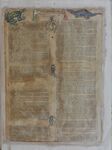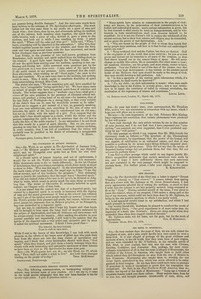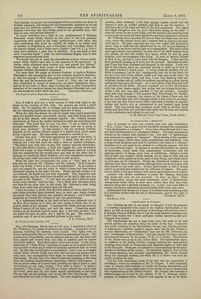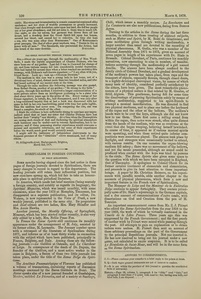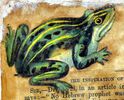 |
 |
 |
 |
 |
The Inspiration of Ancient Prophets
Sir,—Dr. Wyld, in an article in The Spiritualist of January 25th, says:—“No Hebrew prophet was ever controlled by any departed spirit, and no Evangelist ever spoke but as from his own God enlightened spirit.”
In a liberal spirit of honest inquiry, and not of captiousness, I would like to ask Dr. Wyld’s authority for making this statement. Bible statements seem to me to teach differently. In the 1st Chapter of Revelations, God gives Jesus a revelation, which Jesus sends an angel to show to John. Who was this angel? In the nineteenth Chapter, at the tenth verse, of the same book, the angel says to John, “I am thy fellow-servant, and of thy brethren the prophets.” This statement seems to justify the conclusion that the angel was a “departed spirit.” If he did not control John (John was in the spirit), he dictated to John what to write, which comes to pretty much the same thing as controlling him. The writer of Chronicles II. evidently believed in spirit control; see Chapter xviii. of that book.
It is not stated that the control was that of a departed spirit; but control by a departed spirit is as much in harmony with the dignity of man and the moral government of God as the control just referred to, and I am of the opinion most people would say more so. I have read Dr. Wyld’s articles with pleasure and profit, but cannot, without some proof, accept his statement that no Hebrew prophet, or no Evangelist, was ever controlled by a departed spirit.
Let me say, in conclusion, that I hope big hearts and clear heads will be brought to bear upon the large field of inquiry embraced by the subject of Spiritualism, and that all littleness and narrowness will be always absent from the inquiry. After reading the articles in your journal carefully and impartially, I still hold to the opinion that the spirits of the departed take a very active and extensive part in what is called the spiritual movement. I think I have proof that—
The beloved, the true-hearted, |
While I rest in the haven of this knowledge, I can look with much pleasure on the efforts of the brave crew of gifted men who push their boat from the shore out into the deep waters of speculation and inquiry, and I think that every Spiritualist should wish them, “God speed,’’ when they depart, and give them a hearty welcome when they return with such interesting and instructive specimens of their labours as have been on view in The Spiritualist for some time past.
Item.—Dr. Wyld quotes Lev. xix. 31; see also Exod. xx. 18, which says, “Thou shalt not suffer a witch to live”’ Are both these passages binding on the people of to-day?
London-road, Peterborough.
Will-Power
Sir,—In your last week’s issue, your correspondent, Mr. Theodore Ellis, makes two mis-statements in connection with my name, which I hope you will allow me to correct.
He says:—In your impression of the 15th February Miss Kislingbury expresses her conviction that certain phenomena were produced by her will power.
I have read through the only article written by me in that number of your journal, and I do not find that I have expressed any “conviction,” nor asserted, nor even suggested, that I ever produced anything by my “will power.”
The only passage on which I can suppose that Mr. Ellis founds his statement, reads as follows:—“The members of the Theosophical Society discovered, by experiment, that the power of the human will was capable^ of cultivation to an unlimited extent, and that it was possible to perform by its means many things hitherto supposed attributable to departed spirits alone. They did not say that the spirits of departed human beings did not perform them, but that they did not necessarily perform them.”
I can find no other passage which could in any degree justify Mr. Ellis’s unqualified statements that certain assertions were made by me, and I hope I have sufficiently shown that such assertions are not contained in the only passage which might be supposed to contain them. For further proof, I refer your readers to the paper itself.
Spiritualism in Glasgow.
Sir,— During my stay of one month in Glasgow, I had the pleasure of becoming acquainted with many of the leading Spiritualists of the place, as well as having the privilege of attending a few private seances. I thought, when in Belfast, that it was the most bigoted, sectarian town I ever had visited, but I must apologise, confess ignorance, and give Glasgow that honour.
The Spiritualists are not a large body here, but seem to be well united, quality, not quantity, being the order of the day. I attended four public meetings of the Spiritualist’s Society, and had the privilege of hearing two carefully compiled papers read; one by Mr. Walker, a veteran Spiritualist, on “Mesmerism,” and one by Mr. Robertson, on the “Advantages of Spiritualism;” and last, though not least, two able and eloquent lectures by the guides of Mr. J. J. Morse. The lectures of Mr. Morse were given in the Albion Hall. The Spiritualists have, in addition to the public Sunday evening services, two semi-private meetings every week, on Wednesday and Saturday nights, at their hall in the Trongate. Strangers are admitted to these meetings by the introduction of members of the society. On Saturday nights a seance is held for trance-speaking and physical manifestations, Mr. David Duguid being the principal medium, but while Mr. J. J. Morse was here his guides occupied the time.
Not the least interesting event of my stay was the opportunity of attending a seance by invitation of Mr. D. Duguid. I have frequently come in contact with mediums, of nearly all classes, descriptions, and pretensions, but I have seldom been in the society of one so unassuming and unpretentious as Mr. David Duguid. Mr. Duguid was formerly a cabinet-maker, but is now in the employ of Mr. J. Bowman, photographer, of Jamaica-street, Glasgow, and appears to me to be about forty-five years of age; married; has a pretty large family; all his children are medial, but not to the extent of their father. In company of Mr. Bowman, I went to Mr. Duguid’s house on Tuesday evening, the 25th, to attend the seance, and as soon as I entered the house, became conscious of the presence of the unseen ones by the strong aural surroundings, which are much better felt than described. There was much to cheer and please in the presence of the medium’s wife and children; a quiet happiness seemed to pervade the place. To say I felt at home is the highest compliment I can pay these worthy people. After a chat in the kitchen we all retired to the parlour at eight o’clock, to hold the seance. The circle consisted of Mr. Nesbit, printer and publisher; Mr. Garrivale, secretary of the circle; Mr. Simpson, honorary secretary of the Glasgow Spiritualists’ Society; the medium, Mr. Duguid, and myself. The medium was soon controlled, like one simply passing into a gentle sleep. His spirit friends answered a number of questions put by members of the circle; the questions were chiefly of a theological character, and indicated to my mind the status of the questioners. The answers were of an advanced and progressive nature. Two hours were consumed in this way, during which advice as to the best method of conducting the public service was given, as well as a promise that if the friends wished it, the guides of the medium would materialise at the Saturday night meetings in the Trongate. The spirits controlling claimed to be Hermes, Hafed, and Steen, to which I sincerely accord my belief, and I am led to do so from three considerations: 1st. From all I have read in connection with these controls, and—2nd. Hear from persons of undoubted veracity who have attended the stances from time to time. 3rd. From what was observed myself at this stance, and shall now record as plainly as possible. At the conclusion of the first part of the seance, already mentioned, Mr. Bowman asked “Steen”—who was then in possession of the medium—if he would kindly do a “wee bit of a pictur” for the stranger. The control kindly consented. Mr. Duguid, while in the trance state, opened the large paint box placed upon the table, prepared his paints and pallet; he then took a small carte, and tore off a small piece of the corner, and gave to me to hold, so as to be able to identify the card again. This all took place in the light, and under our strict scrutiny. Now, singular to state, I had no sooner got the small piece of card (the torn piece) in my hand, and was just in the act of placing it in my purse, when it was taken out of my fingers by some invisible power. Two gentlemen sitting next to me saw it disappear, nor could it be found for over five minutes, although the small room was carefully searched. It was found under my chair at last. “Steen” desired the medium to be thoroughly secured, and that every test I could suggest should be employed. The medium was then thoroughly fastened to his chair, which was placed about two feet from the small table, upon which the pallet and paint box were. His hands were crossed and secured with a handkerchief, his arms were made fast to the back of the chair, and his legs secured to the legs of the chair. All the fastenings were made doubly secure, by covering them with gummed paper. Having satisfied myself that the medium was thoroughly secured, so much so, that it would have made any “test-maniac” blush to have seen him, the lights were put out, and Mr. Bowman commenced to sing “Auld Lang Syne,” in which the rest of the company joined. At the conclusion of the fourth verse, raps were given to “light up,” which was done. A beautiful miniature landscape was found, “the paint still wet,” upon the table. Upon comparing the card with the tom corner, it was found to fit exactly. I shall forward the painting for the inspection of visitors to 38, Great Russell-street. Although a “trifle” in itself, it is a link in the mighty chain of evidence which binds the visible to the invisible. During the painting of the picture I had an unasked for test of the painting of it by super-human powers, and of its hot being touched by mortal hands at all. When the gas was put out, the fitful gleams from the fire, ever and anon brightened up the room, and it was found necessary before anything could be done to cover the fire. This was done, still there was enough light (to my eyes) to make darkness visible. I saw that the medium never moved from the position in which he was at first placed, as there was light enough to discern the slightest movement on his part; had he moved, it would have been detected at once. The painting, although in several colours, was done with two brushes only. I also saw the brushes rise untouched by human hands, and silently and rapidly accomplish the work, as it were, of painting a picture by themselves.
There is another little matter I must mention before I close. I find the spirits who control Mr. Duguid do it so effectually, that while the medium’s eyes are closed, and the pupils dilated, as in a mesmeric sleep, they (the spirits) can see everything that is done upon the physical plane. I gather this from a number of remarks I heard made by the medium. For instance, I accidentally touched the table, which was a slight distance from the medium; I had scarcely done so, when the control immediately told me to be careful, not to do it again. Whether these paintings are done in darkness or light, the phenomenon is truly marvellous. Whether painted by the spirit of the medium, or, as claimed, by the spirits of Steen and Ruysdael, it is worthy of our most thoughtful attention and profound investigation. I give the facts, and let theorists fight it out.
One word to Theosophists, spirit-of-the-mediumists, and mesmerists. When they shall, one or all, produce a single rap, or the most elementary physical phenomenon by occultism, magic, or will-power, then I shall be prepared to believe that the wonders I here record were produced by the spirit of David Duguid. Furthermore, I shall believe—slowly, calmly, and deliberately (not say in haste)—“that all men are liars,” in trance and out of it, and that Hermes, Hafed, Ruysdael, and Steen are but aliases of one David Duguid; and that J. J. Morse, Tien Sien Tie, and the Strolling Player are one and the same person.
I am now at Hull, and should be happy to work in co-operation with any of the Spiritualists of the place.
29, Silver-street, Hull.
 |
 |
Fac-Simile Signatures Through Writing Mediumship
Sir,— About six years ago, through the mediumship of Mrs. Woodforde, I made the (spirit) acquaintance of Charles Dickens, who has since been one of my guides. Last fall I was in Cornwall for change of air, and from various causes fell into considerable mental depression. This had lasted for several days when a letter reached me enclosing this message, with Dickens’s well-known signature:—“I am often with you, friend Snow. Look up; look up.—Charles Dickens.”
The medium in this case was a young lady in her teens, not of a devotional turn of mind, distant more than two hundred miles, and who had heard nothing of my mental state at the time.
Through the same medium the following message was also passed, from Robert Burns, another of my guides—“Be strong in thy faith.”
Again, through this medium I received a longer communication of a more private nature from an intelligence professing to be a sister who died about thirty years ago in the prime of life. Every vestige of her former signature, in letters, &c., had disappeared, and it was only after a long-continued inquiry that at last a book was discovered with her name in full in her own handwriting, paled with time but quite legible. This the medium had never seen. On comparing the two, one was found a complete facsimile of the other.
I think the evidence is here sufficiently strong to convince any unprejudiced mind that at least my sister and Charles Dickens have lost neither their “trinity” nor identity. At a time when the Theosophists are raising such clouds of dust and darkening the spiritual atmosphere such instances may be useful—not to veteran Spiritualists, but to inquirers; and if those possessing similar experiences would overcome a natural and excusable reluctance, and lay some of their experiences before the world, much good would certainly result.
I might add the testimony of independent clairvoyants to the frequent presence of the “identities” above mentioned, and of many others,
18, Atlingworth-street, Marine-parade, Brighton, March 2nd, 1878.
Spiritualism in Foreign Countries
Some months having elapsed since the last notice in these pages of foreign journals devoted to Spiritualism, there are many changes to record in regard to this department. The leading journals still retain their influential position, but new ones have sprung up, which bid fair to take an honourable place in spiritual periodical literature.
In America, which needs but brief mention (being scarcely a foreign country, and notably as regards its language), the Spiritual Magazine, which was issued monthly, with some omissions, since the year 1873 at Memphis, Tennessee, has disappeared as a separate publication, and its editor, Dr. Watson, is now represented in the Voice of Truth, a new weekly journal, published in the same city. Its proprietors and chief editors are two ladies, Mrs. Mary Shindler and Mrs. Annie Hawks.
Another journal, the Monthly Offering, of Springfield, Missouri, which has been started rather recently, is also very ably edited by a lady, Mrs. Nellie Pease Fox.
In France the Revue Spirite still continues its monthly appearance under the management of M. Joly, assisted by its former editor, M. Leymarie. The January number opens with a retrospect of the literature of Spiritualism during 1877, and informs us of at least thirty works in connection with the subject which have been published, principally in France, Belgium, and Italy. Among these are the following journals:—Le Galileen at Ostende, and Le Chercheur at Liege. In consequence of the death of Dr. Dupuis, the founder of the Galileen, and a most active worker in the cause in Belgium, a fusion of these two little journals has taken place, under the title of the Revue Beige du Spiritisme.
The Academie Pneumatologique of Florence has published a volume of transactions, containing reports of discussion meetings convened by the Baron Guittera da Bozzi. The Revue speaks also of a new journal founded at Guadalajara, Mexico, entitled La Discusion, and of a society at Santiago, Chili, which issues a monthly review. La Revelacion and La Constancia are also new publications, dating from Buenos Ayres.
Turning to the articles in the Revue during the last three months, in addition to those treating of abstract subjects, such as Matter and Spirit, by M. Rossi de Giustiniani, and some meditations given through writing mediumship, a larger number than usual are devoted to the recording of <... continues on page 7-10 >
Editor's notes
- ↑ image by unknown author. colored picture
- ↑ image by unknown author. colored picture
- ↑ image by unknown author. colored picture
- ↑ image by unknown author. colored picture
- ↑ image by unknown author. colored picture
- ↑ The Inspiration of Ancient Prophets by unknown author, London Spiritualist, No. 289, March 8, 1878, p. 119
- ↑ Will-Power by Kislingbury, E., London Spiritualist, No. 289, March 8, 1878, p. 119
- ↑ Spiritualism in Glasgow. by Coates, J., London Spiritualist, No. 289, March 8, 1878, pp. 116-7
- ↑ image by unknown author. colored picture
- ↑ image by unknown author. colored picture
- ↑ Fac-Simile Signatures Through Writing Mediumship by Show, Albt., London Spiritualist, No. 289, March 8, 1878, p. 120
- ↑ Spiritualism in Foreign Countries by Kislingbury, E., London Spiritualist, No. 289, March 8, 1878, p. 120
Sources
-
London Spiritualist, No. 289, March 8, 1878, p. 119
-
London Spiritualist, No. 289, March 8, 1878, pp. 116-7
-
London Spiritualist, No. 289, March 8, 1878, p. 120
